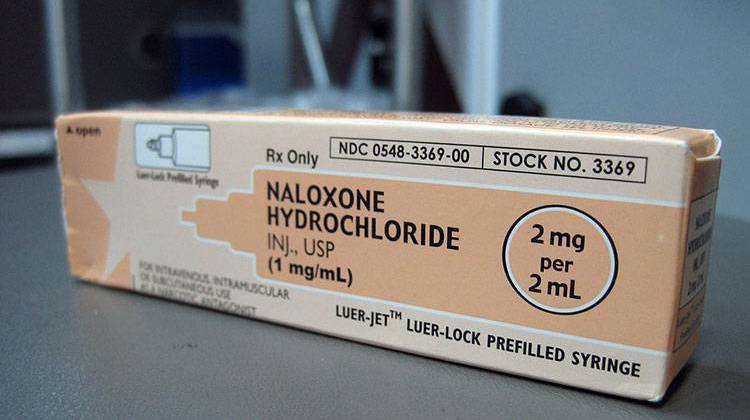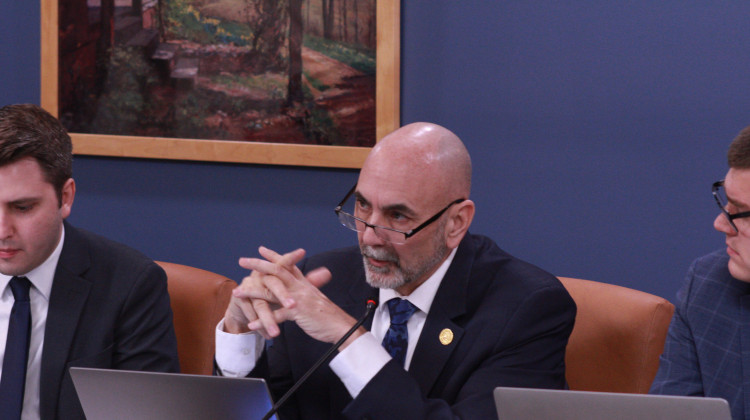
Lawmakers are debating legislation that would expand access to naloxone, also called Narcan.
Photo by Intropin, CC-BY-3.0When Justin Phillips lost her son Aaron to a heroin overdose on October of 2013, she didn’t know there was a drug that could have saved his life. Now she’s a passionate advocate for expanding the availability of that drug, naloxone, in Indiana.
At a recent Indiana House committee meeting, she told lawmakers that she doesn’t want other parents to go through what she did.
“Aaron was a brother, a friend, a talented quarterback, and an adolescent without a fully-formed decision-making center in his brain,” she said. “Aaron only used heroin for four short months. And he really wanted to quit,” she told the crowd. When Aaron decided to use one more time while waiting to get into treatment, he experienced a fatal overdose, Phillips recounted. He was twenty.
Administered as an injection, or as a nasal spray, naloxone, also called Narcan, can bring someone from unconscious and barely breathing to sitting upright and speaking within about a minute. Applicable whether the overdose is from heroin or prescription painkillers, naloxone attaches to the brain’s opioid receptors, blocking opioids from access, and stopping their effect almost instantly. It works best if it’s administered quickly, and is not addictive. Last year, a state law expanded its use from paramedics, who have used it for decades, to first responders like fire and police. A bill currently in the statehouse, SB 406, authored by Senator Jim Merritt (R-Lawrence), would allow doctors to write naloxone prescriptions for friends and family members of addicts.
Like other parts of the country, Indiana has seen a decline in deaths from prescription drug overdoses, but an increase in heroin overdose deaths since 2011. The two trends are related. A state prescription drug monitoring program called INSPECT now keeps track of names and birthdates every time a Hoosier picks up a prescription narcotic at a pharmacy. INSPECT prevents individuals from filling multiple prescriptions for the same addictive drugs at the same time. Many heroin users say they switched from prescription opioids because heroin is cheaper and easier to access.
Justin Phillips, who now runs a non-profit called Overdose Lifeline, was involved in the early stages of SB 406, helping Senator Merritt by researching similar legislation in other states. Yet she and other advocates were not happy with the bill as it came out of the Senate, because a provision was added that would subject naloxone to tracking under INSPECT.
Phillips says that if naloxone prescriptions are tracked along with identities in a database doctors, pharmacists and law enforcement officials have access to, it will discourage addicts and their families from asking for the drug. “It's going to label me, my family, my child, whoever is getting that prescription,” she says, “because it's going to register me as someone who's getting a drug to save someone from an overdose. It's a very difficult stigma for a parent.”
But to fight the heroin epidemic, the state needs data, says Merritt. “What we need is how many prescriptions of Narcan have been purchased in a year… We have to get rid of the stigma of addiction, that it's an illness or a sickness. And we have to show that it's widespread,” says the Senator. If those two objectives are accomplished, he says, it will open up the possibility of state funding for addiction recovery.
At first, Merritt favored tracking prescriptions through INSPECT. But now he’s working with other lawmakers on an alternate system that would track prescriptions, but not personal data, in hopes to replace the INSPECT provision. The next step for the bill, a vote in the House Public Health Committee, is expected Wednesday afternoon.
For more on naloxone in Indiana, read Andrea Muraskin’s related story from Sound Medicine News.
Andrea Muraskin can be reached at amuraskin@wfyi.org or (317) 614-0444. Follow Andrea on twitter: @Andrea_Muraskin.
 DONATE
DONATE






 Support WFYI. We can't do it without you.
Support WFYI. We can't do it without you.